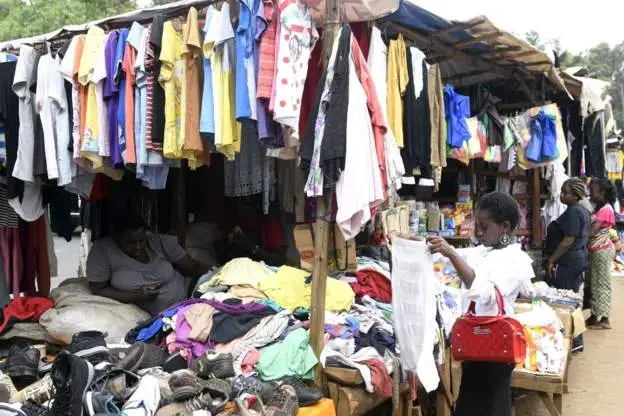
Kenya - Kenya has now become the leading importer of second-hand clothes across Africa, surpassing Nigeria in a development that highlights the nation's struggle to revitalize its once-thriving textile industry. The influx of used apparel, locally known as "mitumba," reached a staggering Sh38.5 billion ($298 million) in 2023, marking a 12.45% increase from the previous year, according to data from the Massachusetts Institute of Technology (MIT).
This surge in mitumba imports positions Kenya as a significant destination for used garments, even exceeding the import volume of Nigeria, a country with a population over four times larger. The affordability of these second-hand clothes caters to a significant demand within Kenya, but it also casts a shadow over the prospects of the domestic textile sector.
The variety of imported mitumba is extensive, ranging from everyday wear like underwear, dresses, shirts, and trousers to outerwear and shoes. Additionally, the imports include other used textiles such as bedding, towels, curtains, fabric scraps, and industrial rags.
Tobias Alando, CEO of the Kenya Association of Manufacturers, expressed concerns about this trend. "I think we have not been intentional about growing the textile sector," he stated in an interview, highlighting a perceived lack of focus on bolstering local manufacturing.
Regional Contrasts in Trade Policies
The situation in Kenya stands in stark contrast to the approaches taken by some of its neighbors. While Kenya's imports of second-hand clothes nearly equaled Nigeria's in 2022 at Sh34.5 billion ($265 million), and surpassed South Africa's Sh33.76 billion ($261 million), countries like Uganda, Rwanda, and Ethiopia have actively implemented measures to restrict these imports in favor of promoting their domestic textile industries.
Notably, South Africa, which was the leading importer in 2021, now restricts such imports to specific uses like manufacturing industrial wiping rags or for donations to registered charities. Although Nigeria officially bans the importation of used clothes, reports indicate that smuggling from neighboring countries continues to be a challenge. In 2023, Ghana (Sh30.4 billion), South Africa (Sh29.4 billion), Uganda (Sh27.2 billion), and Nigeria (Sh27 billion) followed Kenya in import volumes.
Tax Policy Changes Fueling Mitumba Demand
Recent tax policy changes in Kenya are expected to further drive the demand for mitumba. The removal of the Import Declaration Fees (IDF) and the Railway Development Levy (RDL) through the Tax Laws (Amendment) Act, 2024, has made importing second-hand clothes more cost-effective. This move has been met with strong opposition from local manufacturers, with officials from the Ministry of Trade claiming these amendments were introduced without their consultation.
"You are basically making mitumba coming into the country cheaper," Mr. Alando warned, highlighting the potential negative impact on the competitiveness of locally produced textiles.
Navigating International Trade Agreements
Kenya's reliance on the African Growth and Opportunity Act (AGOA) further complicates the issue. AGOA provides eligible African nations with duty-free access to the US market, a significant benefit for Kenya's textile exports. However, maintaining these privileges requires Kenya to permit the importation of mitumba, a substantial portion of which originates from the United States. Uganda and Ethiopia previously lost their AGOA eligibility after imposing bans on second-hand clothing imports.
Dr. Juma Mukhwana, Principal Secretary for Trade, Industry, and Investment, acknowledged this dilemma. "We are reviving cotton, and for us to revive it, we have to revisit mitumba. But also, the country wants to have AGOA renewed. It is a catch-22," he stated.
Efforts to Revitalize the Local Textile Sector
Despite the dominance of mitumba, successive Kenyan governments have made attempts to revive the local textile industry. The current Kenya Kwanza administration's Bottom-Up Economic Transformation Agenda and the previous Jubilee government's Big Four Agenda both included strategies for this sector.
Significant investments have been made in modernizing Rivatex East Africa in Eldoret, aiming to boost production capacity. The company is now seeking a strategic investor to further enhance its output.
The draft National Cotton, Textile, and Apparel (CTA) Policy 2024 has also been developed to guide the growth of the cotton value chain, with the goal of enhancing the competitiveness and sustainability of the sector. Government plans for 2024-2027 include establishing textile value-addition centers, constructing new ginneries, and modernizing existing ones. Additionally, county industrial development centers will be equipped with tailoring facilities to support local enterprises. The government also intends to launch campaigns to promote Kenyan-made textiles and address unfair trade practices.
Divided Opinions on Mitumba's Role
The debate surrounding mitumba imports remains contentious. Supporters argue that it provides affordable clothing options for a large segment of the population. Conversely, opponents argue that it has severely hampered the growth of the local textile industry, which has the potential to create numerous jobs across the value chain, from cotton farming to retail.
Former Prime Minister Raila Odinga faced criticism during his campaign after suggesting plans to revitalize the textile sector, with opponents leveraging the issue to appeal to mitumba traders.
As Kenya navigates its trade policies and strives to industrialize, the balance between providing affordable clothing to its citizens and nurturing its domestic textile industry remains a critical challenge. The nation's position as Africa's largest importer of second-hand clothes underscores the urgency of finding sustainable solutions to support local manufacturing and reduce its reliance on used apparel.
[Copyright (c) Global Economic Times. All Rights Reserved.]



























